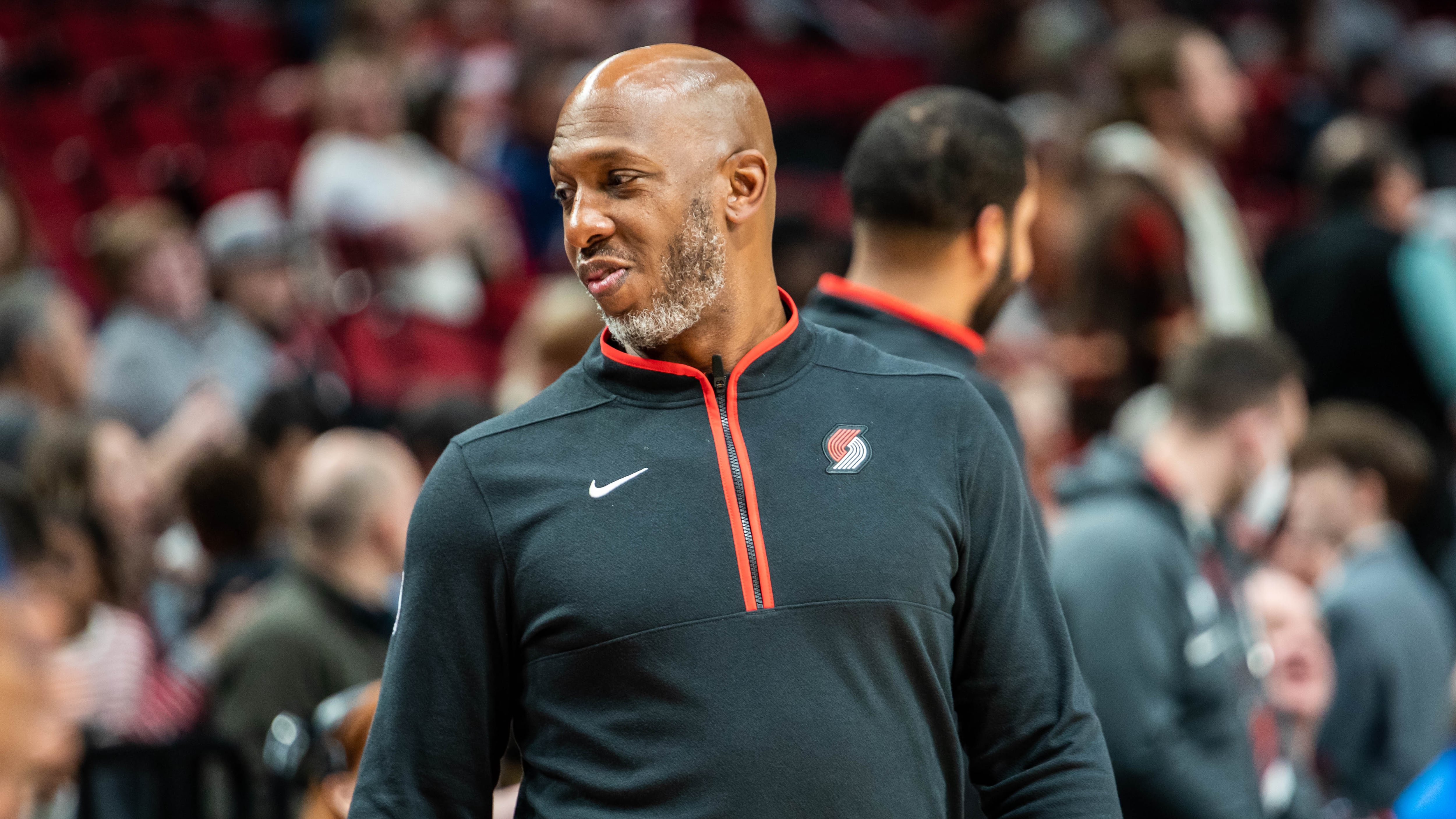In a stunning revelation Thursday morning, the FBI announced it had arrested Trail Blazers head coach Chauncey Billups in Portland for participating in an illicit poker ring run by the Mafia, part of a massive, multiyear investigation into gambling crimes that snared at least 34 people.
An indictment released this morning in U.S. District Court for the Eastern District of New York alleges Billups was paid to use his celebrity to lure unsuspecting gamblers to rigged poker games in Manhattan operated under the protection of the Bonanno, Gambino, Genovese and Lucchese crime families of La Costa Nostra. The indictment says victims lost at least $7 million playing cards against Billups and others complicit in the scheme.
A separate indictment detailing sports betting fraud doesn’t name Billups, but describes an NBA coach matching his description passing along information about the Blazers’ star players sitting out a game as the team began to tank for a top lottery pick in 2023.
“This is the insider trading saga for the NBA,” said FBI director Kash Patel at a Brooklyn press conference. “The fraud is mind-boggling.”
Billups was arraigned today in federal court in Portland and released on the condition that he turn in his passport and not travel except to his trial in New York. (He must secure a bond from the New York district court and is not allowed to gamble.) The Blazers issued a statement today saying they will cooperate with the investigation and confirming that Billups has been placed on leave by the NBA. The team named Tiago Splitter as interim coach.
Billups was among 34 people arrested as part of the federal investigation, which also led to the arrest of Miami Heat guard Terry Rozier and longtime NBA player and assistant coach Damon Jones, both of whom allegedly passed inside information to a network of sports bettors about which players would see action on the court.
But Billups, a 17-year NBA veteran who was inducted into the Naismith Basketball Hall of Fame last October, is the headliner.
Chris Heywood, an attorney with Hoffman Law defending Billups, strongly asserted his client’s innocence in a statement provided to WW Thursday evening.
“To believe that Chauncey Billups did what the federal government is accusing him of is to believe that he would risk his hall-of-fame legacy, his reputation, and his freedom,” Hoffman said. “He would not jeopardize those things for anything, let alone a card game. Furthermore, Chauncey Billups has never and would never gamble on basketball games, provide insider information, or sacrifice the trust of his team and the league, as it would tarnish the game he has devoted his entire life to.”
A grand jury indictment filed Oct. 9 in the Eastern District of New York listed Billups among dozens of defendants participating in a conspiracy referred to by prosecutors as “The Rigged Poker Scheme,” wherein Billups allegedly used his celebrity to lure high rollers to card games up and down the East Coast. Billups and Damon Jones, referred to as “Face Cards,” were both listed as members of “The Cheating Team,” which used sophisticated tech, including electronic sunglasses and chip trays, to cheat the high rollers out of money in games that—though illegal—were purportedly fair.
From April 2019 on, Billups and his co-conspirators are accused of having cheated high rollers out of over $7 million, including one individual, listed as John Doe #1, who lost $1.8 million. (The Blazers hired Billups as head coach in 2021.)
The second indictment, filed in the same district court Oct. 16, is—from the NBA’s perspective—more disturbing. Billups, though not named, fits the description of the following individual: “Co-Conspirator 8, an individual whose identity is known to the Grand Jury, was a resident [of] Oregon. Co-Conspirator 8 was an NBA player from approximately 1997 through 2014, and an NBA coach since at least 2021.” Sean Highkin, an independent journalist with the Rose Garden Report, was among the first to note how closely that description matches Billups’ CV.
This conspiracy, referred to by prosecutors as “The Fraudulent Wagering Scheme,” affected the outcome of NBA games. It features the aforementioned Terry Rozier, at the time a member of the Charlotte Hornets, who has faced scrutiny since 2023 when sportsbooks flagged suspicious activity on bets coming in against his point, rebound and assist totals in a game played in New Orleans, which Rozier pulled himself out of with a foot injury after 10 minutes of play.
Rozier has continued to play in games since then, though he didn’t play in Miami’s season opener Wednesday night.
The Oct. 16 indictment also lists Jontay Porter, then a member of the Toronto Raptors, who was involved in a similar scheme around his stat totals and who in July 2024 pleaded guilty to a federal charge of conspiracy to commit wire fraud in New York, three months after being banned for life by NBA Commissioner Adam Silver.
Co-Conspirator 8, thought to be Billups, is accused of leaking previously undisclosed injury information to another member of the conspiracy, Eric Earnest, pertaining to several of the Blazers’ top players.
The game in question, played March 24, 2023, against the Chicago Bulls in Portland, followed a Blazer victory in Utah where Damian Lillard and most of the team’s veterans had been in the lineup.
However, by that point the team had been eliminated from playoff contention. It seemed a matter of time until the team sat Lillard and the other veterans in order to tank; i.e., play younger players in an attempt to lose and secure a higher draft pick.
The public didn’t know when this would happen. But Co-Conspirator 8 (again, thought to be Billups) did. The indictment states that Co-Conspirator 8 relayed information about the team’s top or veteran players sitting out the March 24 game against Chicago to Earnest.
Earnest then profited from this information along with another conspirator he tipped off, Marves Fairly, who wagered on Chicago, wagers they won when the Blazers’ young lineup was defeated 124–96. (Fairly used multiple legal online sportsbooks to place bets and sent a wire transfer of the profits to Earnest.)
But there may be another NBA player involved in the conspiracy whose name hasn’t yet come to light. Earnest was said to have passed Co-Conspirator 8’s nonpublic information to Fairly, who himself passed it along to someone referred to in the indictment as Co-Conspirator 1.
So far, all the names of current or former NBA players who have been connected to the conspiracies are Jontay Porter, Terry Rozier, Damon Jones, and Billups (only named in the Oct. 9 indictment around the poker games). But, other than Billups, they are all listed by name in the Oct. 16 indictment. However, Co-Conspirator 1 is merely listed as: “an individual whose identity is known to the Grand Jury, was a resident of Florida. Co-Conspirator 1 was at times an NBA player.”
Many expected Billups, the Blazers’ head coach since 2021, to return to broadcasting following the expiration of his contract at the end of last season; instead, he signed a multiyear extension in one of the final acts of Jody Allen’s tenure as de facto owner of the team before she agreed to sell it to Carolina Hurricanes owner Tom Dundon in August. (Following longtime owner Paul Allen’s death in 2018, Jody Allen, his younger sister, had run the team via the Paul G. Allen Trust alongside his college roommate, Bert Kolde.)
Billups’ arrest casts a pall over the sale of the team to Dundon, a deal that was made with a vague pledge to keep the team in Portland and was briefly tied up in litigation following Dundon’s consortium in September unexpectedly adding new backers, Andrew and Peggy Cherng, the owners of Panda Express.
Thursday morning’s news represents a distressing end to a strange saga for Billups in Portland, which saw him take over a purported contender with Damian Lillard in his prime surrounded by a crumbling supporting cast, then coach a young, tanking team full of high draft picks, then ultimately surprise the league and city by delivering on his promises to turn the squad into a winning, defensive-minded unit in the back half of last season.
This season—with the young players blooming and the catharsis of an injured Lillard returning to the team along with veteran guard Jrue Holiday—was supposed to be different. Instead, the organization again finds itself facing an absurdist catastrophe that it will have a hard time digging out of.

